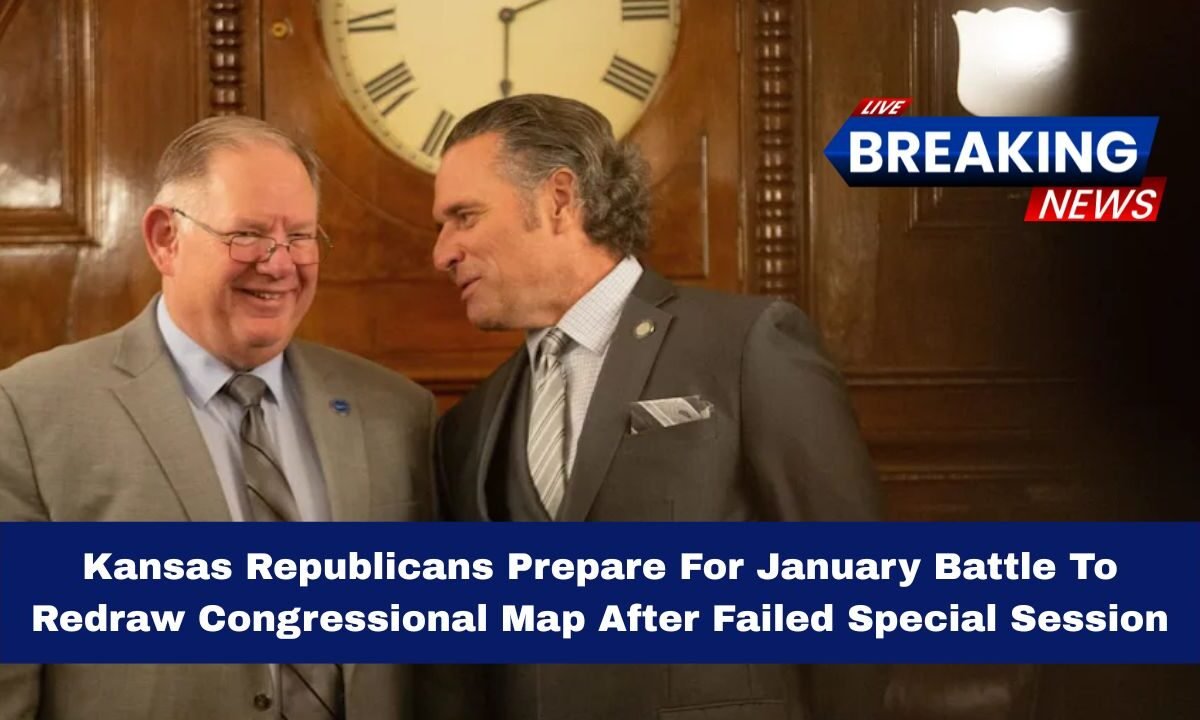Topeka, Kansas — After failing to gather enough votes for a special session, Kansas Republican leaders are preparing for a renewed effort in January 2026 to redraw the state’s congressional map.
The move is part of a nationwide mid-decade redistricting push encouraged by former President Donald Trump, as Republicans seek to strengthen their hold on Congress before the next election cycle.
This attempt aims to reshape political boundaries in Kansas, particularly targeting Congresswoman Sharice Davids, the state’s only Democratic representative. While the special session fell short this fall, Republican lawmakers say the fight is far from over.
The Failed Special Session Effort
Republicans had tried to trigger a special legislative session to pass new congressional maps, but the plan collapsed when not enough members in the Kansas House of Representatives signed the petition.
The State Senate gathered enough support, but the House fell short of the required two-thirds majority.
House Speaker Dan Hawkins admitted that the signatures were insufficient, forcing the party to postpone the effort until the regular session in January. Senate President Ty Masterson confirmed that redistricting remains a top GOP priority.
The main reason behind the delay was disagreement among lawmakers about whether redrawing maps mid-decade — instead of after the 10-year census — would spark legal challenges and public backlash.
Still, Republicans argue that similar redistricting efforts in California and Texas justify action in Kansas to maintain political balance.
Targeting Sharice Davids’ 3rd District
The 3rd Congressional District, represented by Sharice Davids, is at the heart of the dispute. She is the only Democrat in the state’s four-member congressional delegation and has won comfortably in recent elections despite previous redistricting attempts.
A draft map, reportedly circulating among Republican strategists, shows the 3rd District stretched from the Missouri border all the way to the Colorado state line, creating a 14.6% Republican majority. Such a change would drastically alter the political landscape, making it harder for Davids to hold her seat.
Davids criticized the proposal, saying communities “are not bargaining chips” and calling the move a “politically motivated power grab.” She promised to continue defending her district and ensuring that “Kansans choose their representatives, not the other way around.”
Key Facts and Figures
| Detail | Information |
|---|---|
| Special Session Status | Failed due to insufficient signatures in the House |
| New Attempt Date | January 2026 during the regular session |
| Target District | Kansas 3rd Congressional District (Rep. Sharice Davids) |
| Proposed Map Feature | 14.6% Republican voter majority in redrawn map |
| County in Focus | Johnson County may be split between districts |
| Required Votes for Override | Two-thirds majority in both chambers to override a veto |
| Possible Veto | Expected from Democratic Gov. Laura Kelly |
| National Context | Part of Trump-backed mid-decade redistricting push |
What Leaders Are Saying
Senate President Ty Masterson said the push is necessary because Democratic-led states, like California, are redrawing maps to add more Democratic seats. He claimed Kansas must “stay competitive” to prevent losing influence in Congress.
Masterson also mentioned that Johnson County, the most populous in Kansas, may soon have to be split because of rapid population growth.
However, Davids countered that Republicans had already promised to keep the county intact after the 2022 redistricting, calling the new plan “a betrayal of public trust.”
Congressman Emanuel Cleaver of neighboring Missouri echoed Davids’ concerns, calling the process “unconstitutional and immoral,” suggesting that the new maps were being drafted by “Washington insiders” rather than Kansas residents.
What’s Next for Kansas
The GOP plans to revisit the proposal during the January 2026 regular session. If passed, the new map could be implemented before the next midterm elections, potentially changing which party controls one of Kansas’ key seats in the U.S. House of Representatives.
However, to make the change official, Republicans will need enough votes to override a likely veto from Governor Laura Kelly. Even if successful, the move could face legal challenges from Democrats and civil rights groups, which might delay implementation.
The Kansas redistricting debate is heating up as Republicans prepare for a January showdown to reshape the state’s congressional boundaries.
After a failed special session, party leaders are determined to move forward, arguing it’s a necessary step to balance national political shifts. Meanwhile, Democrats see it as a direct attempt to weaken fair representation in Kansas.
As lawmakers return in 2026, the battle over the 3rd Congressional District will test not only party unity but also the principles of electoral fairness and democracy — setting the stage for one of the most consequential political fights in Kansas in years.




